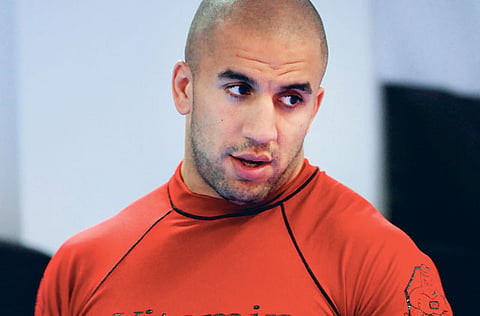'Blood sport' a victim of wrong marketing hype
MMA considered safer than boxing as overall risk of critical injury is low, study says

Dubai/Abu Dhabi: Mixed-Martial Arts (MMA) has long suffered the stereotypical perception as a brutal blood sport. Politicians like senator John McCain called it ‘human cockfighting,' and tried to get it banned.
The fault may lie with early marketing campaigns for MMA and the Ultimate Fighting Championship (UFC) in particular where they tried to attract mainstream viewers by hyping it as the bloodiest and most brutal violent sport in the world.
The sport has come a long way since then; in 2001 the UFC reformed its rules to get sanctioned with the Nevada State Athletic Commission (NSAC).
The UFC has since been sanctioned in 44 states and has regular shows in the UK and Canada, as well as recent events in Germany, Australia and now the UAE.
But the stains of past perception still cling on to MMA even though it is actually a safer sport than boxing.
A study by Johns Hopkins University covering a five-year review of MMA concluded that "the over-all risk of critical injury appears low."
Published in 2008 the study was conducted over 635 professional matches and 1270 athletes. Only three per cent of the fights resulted in severe concussion and there were no deaths or critical injuries during the study period.
"In my 14-year involvement [in sanctioning] boxing I have sadly seen seven deaths in the ring. In all my years with MMA the worst injury I saw was a broken arm," Marc Ratner, UFC Vice-President of Regulatory Affairs and former Executive Director of NSAC, told Gulf News.
"The main difference with MMA and boxing is in the preparation for the fight," says Ratner. "With boxing what you're doing is taking blows to the head everyday, you're practicing getting hit on the head, that's part of the sport. With MMA striking is just one part of it, there is Ju-jitsu, grappling and wrestling so you're not just taking shots to the head."
Ratner added that at the time the UFC is not looking at changes in regulation, "Until we get all of America sanctioned we are not looking at making any changes," he said when talking about the illegal moves such as the vertical elbow also known as the 12 to six elbow.
"With boxing, depending on the severity of the injuries, it can take about three weeks to recover physically and begin training again," Tam Khan, MMA fighter and boxer, said. "In MMA I've suffered a defeat and was in the gym that very night."
Khan is also considered a pioneer of MMA in Dubai, having started MMA coaching in Dubai two years ago.
"In boxing you get a standing eight count, which allows a stunned fighter to recover and continue fighting. In MMA once you're knocked out the fight is over, you don't get a chance to recover and risk escalating head trauma."
"Also with boxing everyone is aiming for head shots, in MMA there are so many different ways to end a fight, so the head is not the main target," Khan said.
Khan leads the Dubai branch of the UK-based Team Sure Grip and is set to open Contender MMA Gym, Dubai's first fully equipped MMA facility with its own cage and full-time coaches.
The UFC always looks to include local talent in their events and that includes referees, "It takes a long time to become a good referee, there are so many aspects to learn about in MMA. But we always keep an eye out for good referees and include them especially in the under card," says Ratner.
Ratner says that the UFC plans to expand into Asia and is looking at possible venues in India, Japan and China. He also said that they have plans for events in South America as much of the talent comes from there. "We hope to make Abu Dhabi and the Middle East and annual event for us, we are very excited about coming here."
Sign up for the Daily Briefing
Get the latest news and updates straight to your inbox


